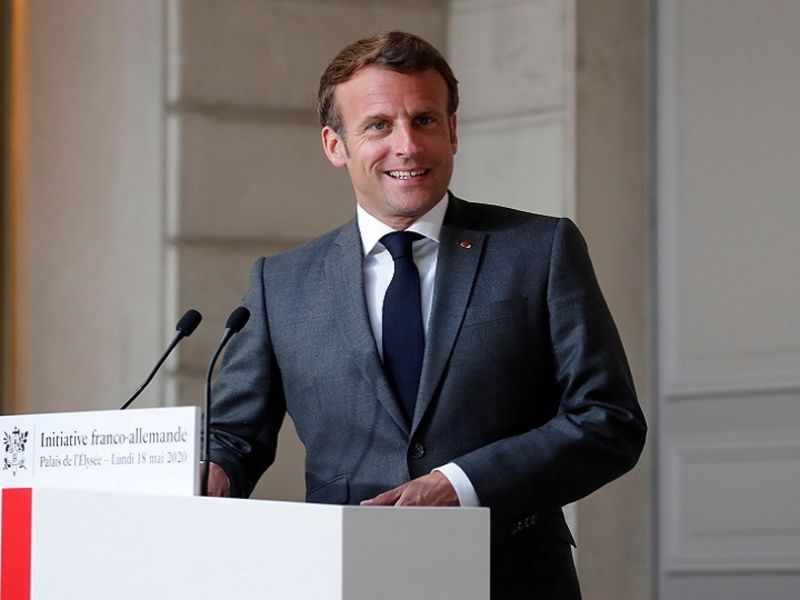
PARIS — The French government has pledged a total of 8 billion euros ($8.8 billion) to help the auto industry recover from the coronavirus crisis, including increased incentives for new electric vehicles and boosting a scrapping program to get higher-polluting older models off the road.
Speaking Tuesday at a Valeo parts factory in northern France, President Emmanuel Macron said the government wanted France to be the European leader in EVs by getting automakers to repatriate production from abroad and develop new models on French soil.
“We need a motivational goal: Make France Europe’s top producer of clean vehicles by bringing output to more than 1 million electric and hybrid cars per year over the next five years,” Macron said at the news conference.
To help reach that aim, Macron said France would increase the state bonus for private consumers buying electric cars (that cost up to 45,000 euros) to 7,000 euros ($7,680) from 6,000 euros.
Business customers can get a 5,000 euro ($5,490) bonus. There will be a 2,000 euro ($2,196) bonus for plug-in hybrid vehicles, as long as they can travel at least 50 km on battery power alone and cost no more than 50,000 euros ($54,900).
The more generous bonus for EVs will be available from June 1 until Dec. 31.
Macron is also doubling the trade-in premium designed to get older, less-efficient models off the road. People who buy a new or used latest-generation gasoline or diesel model can get 3,000 euros ($3,294), while full-electric models are eligible for a 5,000-euro bonus.
Income requirements for the program are being relaxed so that 75 percent of French households are eligible, Macron said.
The doubled bonuses will be available starting June 1 and will last until 200,000 cars are sold. A buyer turning in an older car for a new EV could be eligible for up to 12,000 euros ($13,178) under both programs.
In all, France will set aside more than 1.3 billion euros ($1.4 billion) to jump start demand and reduce dealers’ stocks.
Sales fell 72 percent in March and 89 percent in April under lockdown measures to slow the spread of the coronavirus.
“This is a historic plan for a historic situation,” Macron said.
Renault joins battery venture
Renault will join PSA and the energy utility Total in an all-French venture manufacturing batteries for electric and hybrid cars, Macron said on Tuesday. PSA and Total are collaborating to build battery cell factories in France and Germany.
Renault will develop a 100-kilowatt-hour electric motor for Renault-Nissan alliance vehicles at its site in Cleon, France, rather than in Asia, Macron said. Under a new alliance plan announced this year, Renault will take the lead in EV development.
The French president also announced that PSA Group would be producing a future full-electric 3008 compact utility vehicle at the automaker’s plant in Poissy, near Paris. The 3008 is now available in gasoline, diesel and plug-in hybrid versions.
Other support for EVs includes the installation of 100,000 charging stations by 2021, a measure announced earlier.
Renault loan pending
Macron said that the government would not sign off on a planned 5 billion euro ($5.5 billion) state loan for financially troubled Renault until management and unions had concluded talks over the automaker’s French workforce and sites.
Renault will announce details of a plan to cut 2 billion euros ($2.2 billion) in costs on Friday.
Renault is reportedly seeking to close several small parts and assembly plants in France, and union leaders will be briefed ahead of Friday’s cost-cutting announcement.
In addition to the Renault loan and money for incentives, the French government has subsidized the salaries of some 250,000 automotive and related industry workers during the crisis.
French government officials have signaled their willingness to extend aid to the auto industry in the coronavirus crises, but warned that it was contingent on “repatriating” production from overseas.
Macron did not refer specifically to that demand, but he said that no models currently built in France should be built elsewhere in the future and that “value added” products should be “relocalized” in the country.
Other measures announced Tuesday include a 1 billion euro ($1.1 billion) fund to support production, including 200 million euros ($220 million) in grants to suppliers to upgrade factories. Startups and other promising companies will be backed by 600 million euros ($659 million) in investment capital.
Reuters contributed to this report.